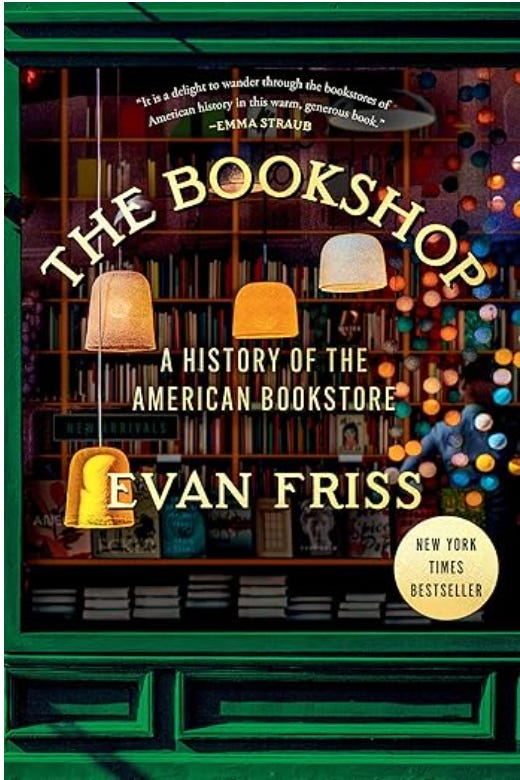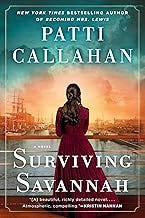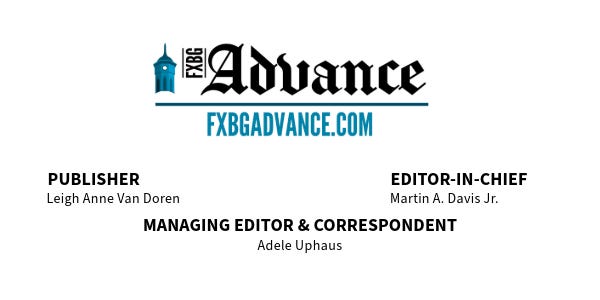
This week’s reviews include the interesting history of American bookstores in Evan Friss’s “The Bookshop” and the story of “The Titanic of the South” in Patti Callahan’s “Surviving Savannah.”
Sunday Books and Culture is edited by Vanessa Sekinger
THE BOOKSHOP
by Evan Friss

Published by Viking (August 6, 2024)
Hardcover $23.98
Audiobook $15.75
Reviewed by Penny A Parrish
When I read a book for review, I take notes highlighting certain quotes or topics I want to include when I write. I have so many notes from this book that they could become another book in itself! In other words, if you love books, you will love THIS book.
The subtitle is “A History of the American Bookstore.” The earliest example is the store run by Benjamin Franklin. Yet, it was not a place solely for books. Franklin was also a printer, editor, and postmaster to name a few of the hats he wore. In 1742, he published the first novel in America (Richardson’s Pamela). To Friss, Franklin’s effort to spread the written word was an effort to “unite the colonies through knowledge.”
Bookstores, better referred to as book shops, flourished in the colonies, especially in New York and Boston. Some were early versions of bookmobiles, hauling hundreds of bound volumes to neighborhoods behind a horse. Some focused on used books, like the famous Strand in New York City. Some people, imitating the book stalls along the Seine in Paris, sold books from cartons or tables on the sidewalk.
Eventually many shops focused on certain themes or lifestyles. Friss provides loving details of shops that house neighborhood events, have a warm puppy or cat on the premises, and offer coffee or wine to those who enter. Many people go into bookstores just to browse, and some of these shops become second homes to those visitors.
Much of this book centers on the independent bookshop trying to survive big business. I grew up near Chicago, but never realized that Marshall Field’s devoted its entire third floor to books beginning in the 1920s. For decades it was run by Marcella Hahner who organized book fairs, colorful themed displays, and book signings by authors. Admiral Byrd, who wrote Little America, went through 2,500 copies at one signing, and supposedly said that the experience made him long for “the peace and comfort of the South Pole.” Tidbits like this are a delight in the book.
Eventually Field’s gave way to Brentano’s and Borders and Barnes & Noble. Hardbacks competed with paperbacks and e-readers. Then came Amazon, which changed the book-buying habits of millions who traded an afternoon browse through the shelves with a click on the computer.
Friss has a wonderful way with words, and his insight and stories are fascinating. This is no dull history book, but like small shops in our area (a salute here to Riverby!), alive with love from the people who visit and treasure them. This book is staying on my shelf.
Penny A Parrish is a long-time book reviewer and artist. Learn more about her by visiting her page at Brush Strokes Gallery, which is in downtown Fredericksburg.

SURVIVING SAVANNAH
By Patti Callahan

Published by Berkley (April 5, 2022)
Paperback $11.79
Audiobook $17.72
Reviewed by Tammy Byram
Historian Dr. Everly Winthrop has been asked to guest curate a museum exhibit in Savannah, Georgia, her beloved hometown. Grieving the tragic death of her best friend, Mora, she is hesitant to take the job. The weight of the decision is even heavier because the job offer has come from Oliver, Mora’s fiancé. The museum collection will honor the SS Pulaski, a steamship (eventually nicknamed “The Titanic of the South”) that sank off the coast of North Carolina, in 1838.
The luxurious ship carried some of Savannah society’s most elite members as they first sailed to Baltimore and then continued by land to their New York summer homes. Everly has cherished memories of listening to her grandfather’s poignant stories of the Pulaski, the Longstreet family (10 members were on board), and the mystery surrounding Lilly Forsyth, her five-month-old daughter, and her maid.
What seals the deal, however, is the fact that the Pulaski wreckage has just been discovered 30 miles off the coast of Carolina. Everything tells Everly not to accept the offer, but the nostalgia and curiosity are just too strong, and she dives right in.
This historical fiction follows two timelines – 2018 and 1838 – and three voices: Everly, Augusta Longstreet (sister of one of the Pulaski’s investors), and Lilly Forsyth (Augusta’s niece and best friend). I really enjoyed Callahan’s use of these parallel timelines as Everly’s attempts to solve some of the ship’s mysteries rub up against Augusta’s and Lilly’s harrowing experiences on board and in the aftermath of the explosion. Callahan’s heartbreaking account of the five days following the explosion are largely based on survivors’ existing writings, including those of Rebecca Lamar, the real inspiration for Augusta.
The character of Lilly is fictional, but we are rooting for her as she uses the tragedy as an attempt to free herself, her daughter, and her maid, Priscilla, from her abusive husband. Though we know the outcome (approximately 130 of the 190 people on board were lost), we are still hopeful in the midst of the sadness and fear.
In her notes, Callahan writes that the Pulaski was indeed discovered about three weeks into her research for the book; as a history major, I find this exciting and serendipitous. Along with this excitement, however, comes a sad (and inevitable?) resignation that seemingly nothing was learned from this tragedy. History will, of course, repeat itself overnight on April 14, 1912, with the sinking of the Titanic.
All in all, this is an interesting and immersive read. Survival is, naturally, a key theme, but it’s more than just a timeline and a list of who lived and who perished. It’s an absorbing look at how people must “survive the survival:” how events change us (for better or worse), who we become in the aftermath, what we do with residual guilt, and how we (hopefully) move forward.
Tammy Byram is a high school librarian who spends too much time on her back porch reading, looking for inspirational quotes, and scheming ways to get to the beach!




Local Obituaries
To view local obituaries or to send a note to family and loved ones, please visit our website at the link that follows.

Support Award-winning, Locally Focused Journalism

The FXBG Advance cuts through the talking points to deliver both incisive and informative news about the issues, people, and organizations that daily affect your life. And we do it in a multi-partisan format that has no equal in this region. Over the past month, our reporting was:
$8 a month supports great journalism
- First to report on a Spotsylvania School teacher arrested for bringing drugs onto campus.
- First to report on new facility fees leveled by MWHC on patient bills.
- First to detail controversial traffic numbers submitted by Stafford staff on the Buc-ee’s project
- Provided extensive coverage of the cellphone bans that are sweeping local school districts.
- And so much more, like Clay Jones, Drew Gallagher, Hank Silverberg, and more.
For just $8 a month, you can help support top-flight journalism that puts people over policies.
Your contributions 100% support our journalists.
Help us as we continue to grow!
Support FXBG Advance for $8 a month







